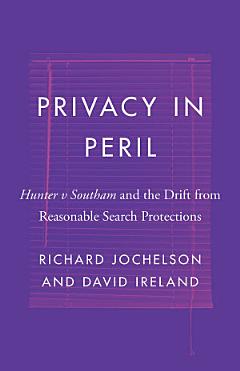In 1984, the Supreme Court of Canada, in Hunter v Southam, declared warrantless searches unreasonable under section 8 of the Charter of Rights and Freedoms. Police would henceforth require authorization based on “reasonable and probable grounds.” The decision promised to protect individuals from state power, but as Richard Jochelson and David Ireland argue, post-Hunter search and seizure law took a turn away from the landmark decision. An examination of dozens of subsequent cases reveals that section 8 protections have become more difficult to obtain in the post-9/11 era. Rather than developing rigorous standards for new search and surveillance techniques and technologies, the courts have used the Charter to sanction broader police powers. Yet, even as it demonstrates that the core principles of Justice Dickson’s vision for section 8 rights have been diminished, Privacy in Peril suggests that increasing citation of Hunter in the halls of justice offers hope that some protection of civil liberties will endure in the twenty-first century.
Hunter v Southam and the Drift from Reasonable Search Protections

